Available Copies from Independent Booksellers
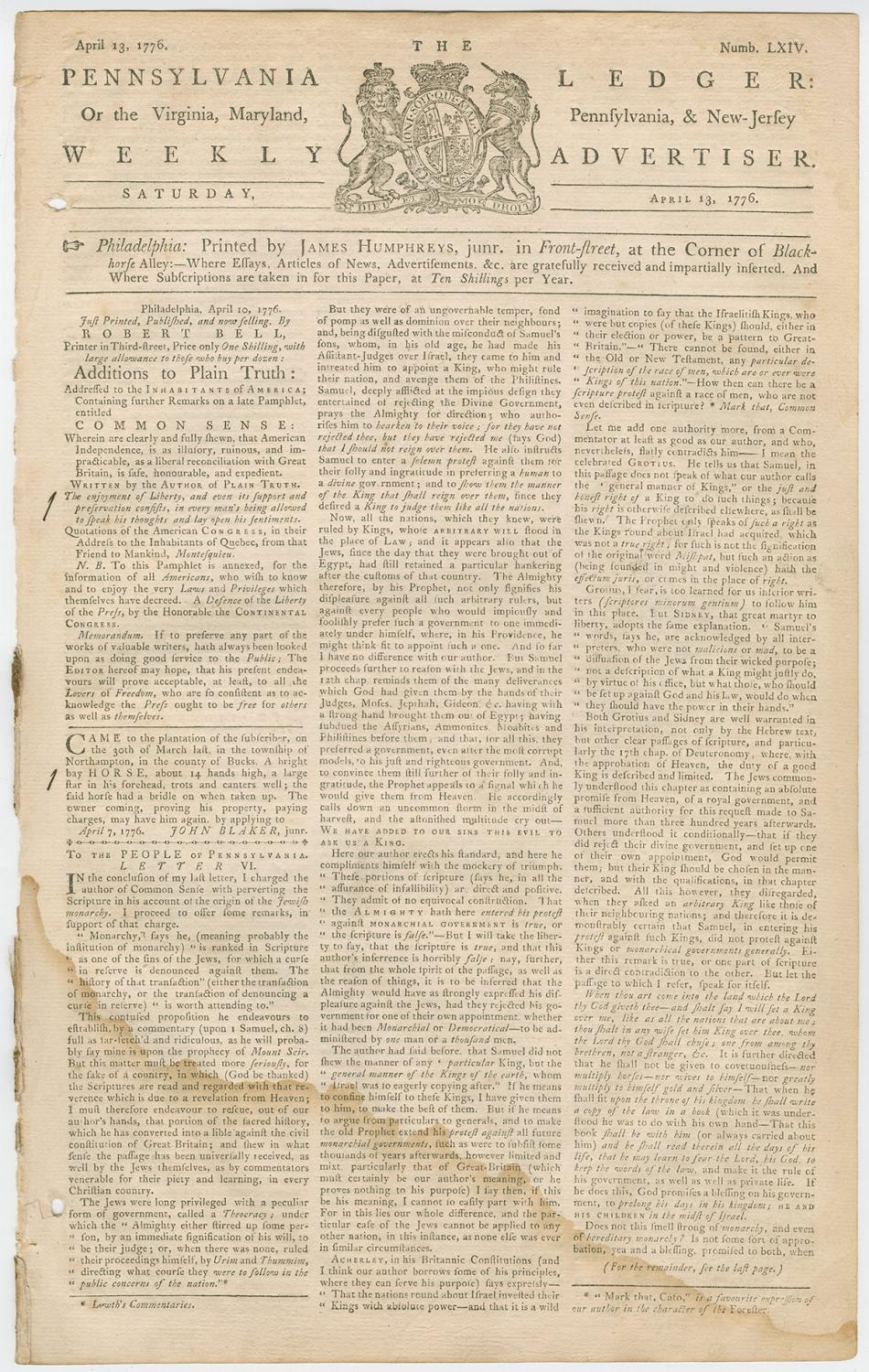
Price: US$1600.00 + shipping
Condition: Fine
Description: Newspaper. The Pennsylvania Ledger: Or the Virginia, Maryland, Pennsylvania, & New-Jersey Weekly Advertiser, April 13, 1776. Including Cato's Letter VI, "To the People of Pennsylvania," attacking Common Sense on political and religious grounds. This issue also prints the first part of Letter II by "Cassandra" [James Cannon]. Philadelphia: James Humphreys Jr. 4 pp., 10 x 16 in. "you have only entertained us with some loose declamations upon abuses in the English government; and shocked us, for want of better arguments, by a perversion of things sacred; filling the papers with personal invectives, and calumnies against all who cannot swallow, at a venture, every crude notion, you may cook up as the politics of the day. This will as little agree with the stomachs of others as with mine; although I have declared that, when the last necessity comes, I have no expedient in view but to take my chance with you, for better and for worse.""Liberty or Slavery is now the question. Let us but fairly discover to the inhabitants of these Colonies on which side Liberty has erected her banner and we will leave it to them to determine whether they would choose Liberty tho' accompanied with war, or Slavery attended by peace." Excerpts -Cato's Letter VI"I charged the author of Common Sense with perverting the Scripture in his account of the origin of the Jewish monarchy. this matter must be treated more seriously, for the sake of a country, in which (God be thanked) the Scriptures are read and regarded with that reverence which is due to a revelation from Heaven; I must therefore endeavour to rescue, out of our author's hands, that portion of the sacred history, which he has converted into a lible against the civil constitution of Great-Britain." (p1/c1)"Here our author erects his standard, and here he compliments himself with the mockery of triumph. 'That the Almighty hath here entered his protest against monarchial government is true, or the scripture is false.'-But I will take the liberty to say, that the scripture is true, and that this author's inference is horribly false. the Almighty would have as strongly expressed his displeasure against the Jews, had they rejected his government for one of their own appointment whether it had been Monarchial or Democratical-to be administered by one man or a thousand men." (p1/c2)"I contend for this-That where a people are left to chuse their own forms of government as has been the case of all the world for some thousand years, there is no particular denounciation of God's displeasure against any Form whether Monarchial or Democratical, under which such a people may think their civil happiness best secured, and their duty to God best performed. You call on me to shew my plan? I have done it. a safe return to a connection with our ancient friends and kindred, accompanied with all the advantages we have formerly experienced, and perhaps more; which I trust are things yet practicable; or, if it should prove otherwise, we can lose nothing by the exercise of deliberation and wisdom in the mean while." (p4/c2)"although you ought to have counted the cost of your work, and have tried to reconcile with your design, a multitude of interests, commercial, political, and oeconomical-you have only entertained us with some loose declamations upon abuses in the English government; and shocked us, for want of better arguments, by a perversion of things sacred; filling the papers with personal invectives, and calumnies against all who cannot swallow, at a venture, every crude notion, you may cook up as the politics of the day. This will as little agree with the stomachs of others as with mine; although I have declared that, when the last necessity comes, I have no expedient in view but to take my chance with you, for better and for worse." (p4/c2)Excerpts - Cassandra to Cato, Number II"Your talent lies in strong painting and declamation, and you expect to hold up such. (See website for full description)
Seller: Seth Kaller Inc., White Plains, NY, U.S.A.
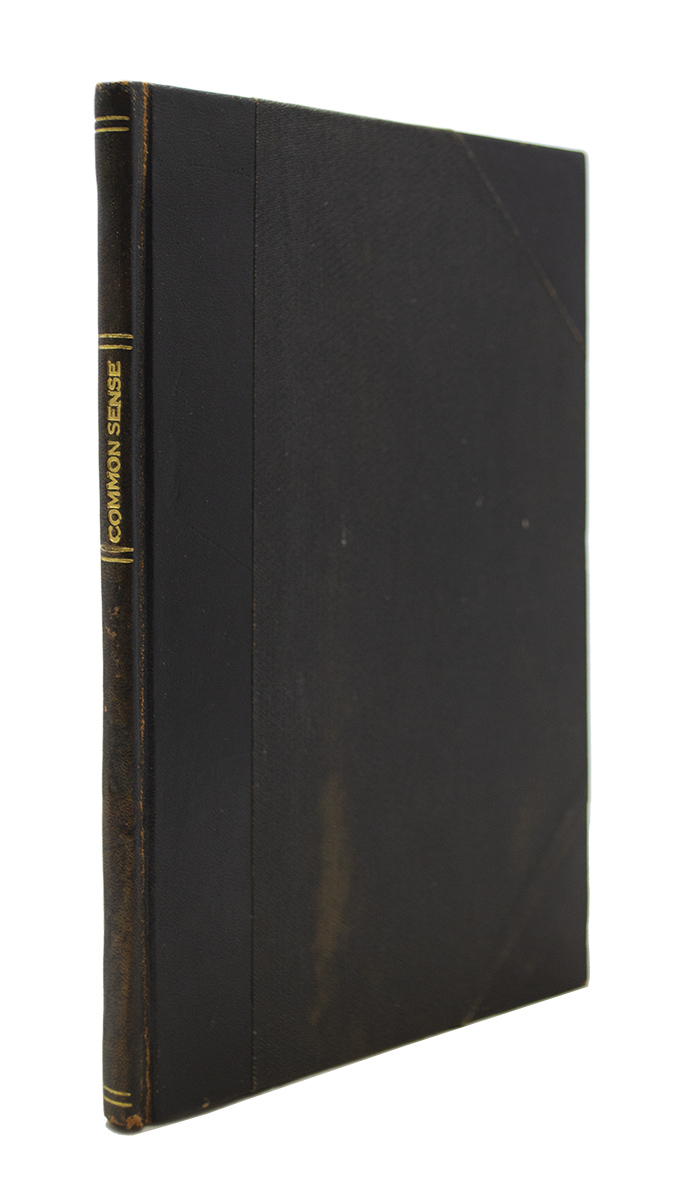
Price: US$17500.00 + shipping
Description: on the following subjects: I. Of the Origin and Design of Government in general, with concise Remarks on the English Constitution. II. Of Monarchy and Hereditary Succession. III. Thoughts on the present State of American Affairs. IV. Of the present Ability of America, with some miscellaneous Reflections. A new edition, with several additions in the body of the work. To which is added an appendix; together with an address to the people called Quakers. N.B. The New Addition here given increases the work upwards of one-third. Philadelphia, printed; London, re-printed: For J. Almon, 1776. J. Almon English edition. Octavo (7 3/8 x 4 3/4 inches; 188 x 121 mm). [4], 54 pp. Issued without half-title. Later black half calf over black cloth. Spine ruled and lettered in gilt. All edges speckled red. Some rubbing to edges and corners. Bottom of spine with minor chipping. Hairline splits at top and bottom of the spine, but holding firm. Some occasional light foxing and soiling to the text, mostly at the end. And old inkstamp of Lonox Library New York to verso of title page, and "Duplicate" stamped at lower right corner of title page recto, old bookseller's entry and paper remnant at bottom of final page, not affecting text. Overall a very good copy. "Even after Lexington and Bunker Hill, it is probable that a majority of the American people hoped for a reconciliation under which they would have freedom, but as citizens of a British Empire. The radical party had portrayed King George as a benevolent monarch, surrounded by wicked ministers, and few dared even mention independence. Paine's Common Sense, published anonymously in January, 1776, as the first vigorous attack on King George, a "hardened, sullen-tempered Pharaoh," Paine called him, and the first public appeal for an American Republic. It is not too much to say that the Declaration of Independence, was due more to Paine's Common Sense than to any other single piece of writing" (Grolier). Church 1135. Evans 14958. Gimbel CS-30. Grolier, 100 American, 14. Howes P17. Sabin 58213. HBS 68416. $17,500.
Seller: Heritage Book Shop, ABAA, Beverly Hills, CA, U.S.A.
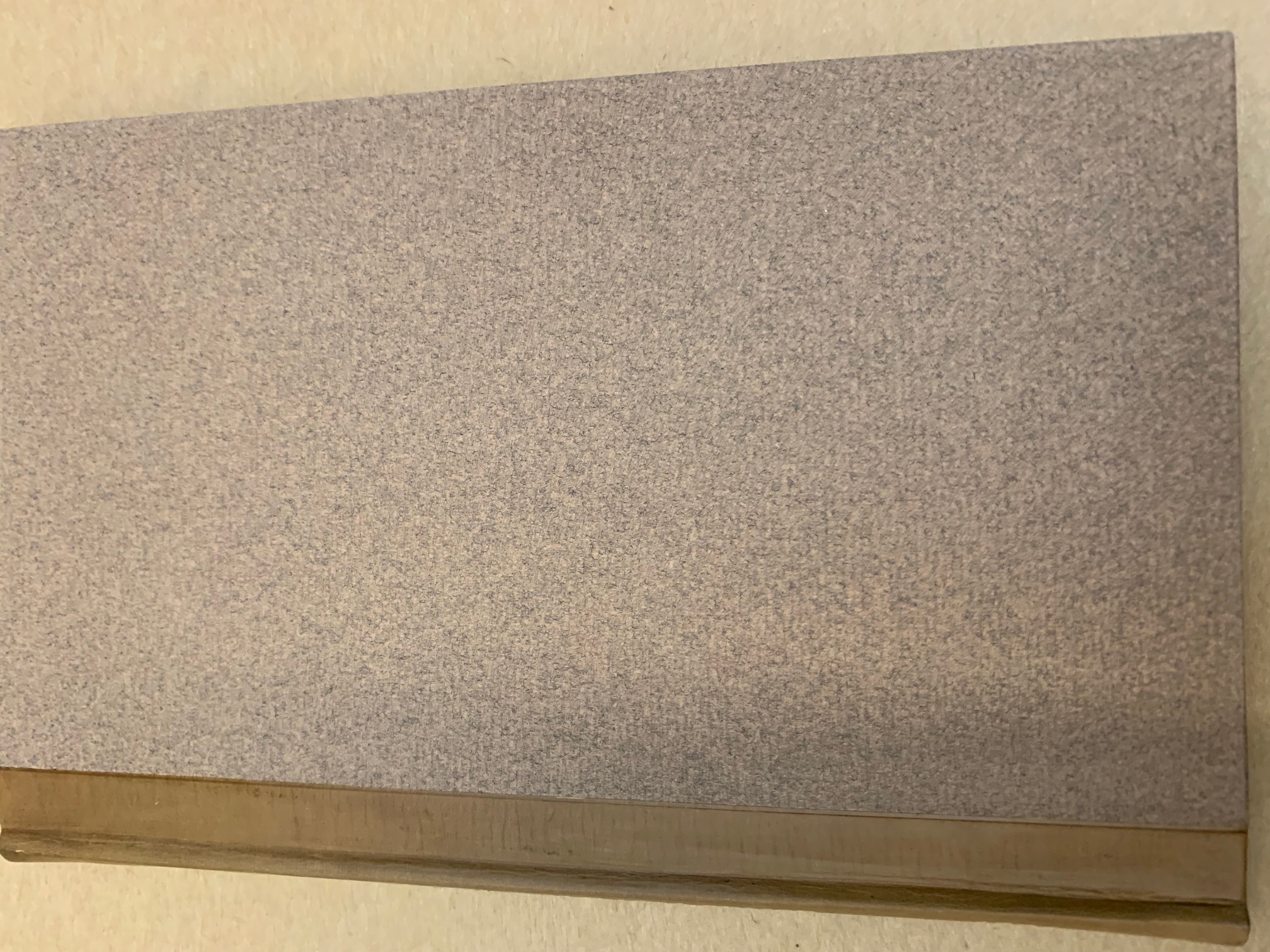
Thomas Paine. Large Additions to Common Sense. Robert Bell, 1776.
Price: US$18900.00 + shipping
Condition: Very Good
Description: Thomas Paine, LARGE ADDITIONS TO COMMON SENSE, 1776, published in Philadelphia by Robert Bell, who published the first editions of COMMON SENSE. This publication was issued at a reduced price for persons who had previously purchased COMMON SENSE, and as an annex to a larger edition of Paine s revolutionary work. This volume is the scarce iteration intended for the first purchasers; as such, its numbered pages are from 82 through 147. A small, insignificant bite is missing from one of the unnumbered pages. This iteration is the second issue of the first edition. (R. Gimbel, A Bibliographic Check List of Common Sense, Oxford University Press 1956, at p. 42. Sabin, 58212; ESTC W20611. Having left school when he was 12, Thomas Paine, the son of a corset maker trained to take-up that occupation, revealed no genius as he went from job to job. But on January 10, 1776, a month before he turned 39, Paine exploded onto the transatlantic stage as the foremost advocate of obtaining liberty for the colonies by fighting the British. Paine himself commented that any literary talent he might have had was buried in me and might ever have continued so, had not the necessity of the times dragged and driven him to write. (The Crisis, No. VIII, ¶6.) Historians credit Paine s 1776 publication of Common Sense, which he allowed others to reprint, with galvanizing public opinion for independence which led to the Declaration of Independence, the Revolutionary War, and the United States becoming an independent non-monarchical nation. Paine s importance to the cause was cemented by the first issue of The Crisis which George Washington had read aloud to the army he commanded. Without Paine's pen, the war might well have been lost almost as soon as it began. Modern hardcover binding. Gilt lettering on side binding reads: PAINE'S ADDITIONS TO COMMON SENSE * 1776.
Seller: Paines Pen, Guerneville, CA, U.S.A.

Thomas Paine. Common Sense. Philadelphia, Printed; London, Re-Printed, for J. Almon, 1776.
Price: US$29500.00 + shipping
Condition: Very Good
Description: "Second edition, corrected;" one of four Almon editions, this one issued with James Chalmer's Plain Truth, a half-title page listing both works. Octavo. (6), 54 pp. Hardcover, bound in modern calf over marbled boards with new endpapers. Some marginal discoloration, else unmarked. [Howes P17. Sabin 58214].
Seller: Moroccobound Fine Books, IOBA, Lewis Center, OH, U.S.A.

Price: US$50000.00 + shipping
Description: Scarce 1776 separate edition of the Large Additions to Common Sense. The title reads in full: Large Additions To Common Sense: Addressed To The Inhabitants Of America On The Following Interesting Subjects. I. The American Patriotâs Prayer. II. American Independancy, defended by Candidus. III. The Propriety of Independancy, by Demophilus The dread of Tyrants, and the sole resource Of those that under grim Oppression groan. Thomson. IV. A Review of the American Contest with some Strictures on the Kingâs Speech. Addressed to All Parents in the Thirteen United Colonies by a Friend To Posterity And Mankind. V. Letter to Lord Dartmouth, by an English American. VI. Observations on Lord Northâs Conciliatory Plan, by Sincerus. To Which Is Added And Given An Appendix to Common Sense; Together with an Address to the People Called Quakers on their Testimony concerning Kings and Government and the Present Commotions in America. Octavo, bound in three quarter morocco over boards, gilt titles and five raised bands to the spine, marbled endpapers. In very good condition, internally very clean. Rare with only two examples appearing at auction in the last 80 years. "One of the founding fathers of the United States, Thomas Paine authored two of the most influential pamphlets at the start of the American Revolution, which ultimately inspired the 1776 Declaration of Independence. Virtually every American rebel read Paineâs powerful pamphlet Common Sense which crystallized the American Revolution and demand for independence from Britain. John Adams asserted "without the pen of the author of Common Sense, the sword of Washington would have been raised in vain." The 1776 Large Additions lends insight into the fascinating publishing history of the most important and popular tract of the American Revolution. After the publication of the first edition of Common Sense by Bell in 1776 in a small edition of 1000 copies, Paine was greatly disappointed when Bell advised him there were no profits. He had intended to donate the proceeds to the causes of liberty and independence. Paine and Bell 44 had an immediate falling out and Paine subsequently hired Bradford to print a competing edition. This naturally infuriated Bell who included an attack on the still anonymous author in his next printing. The controversy between Bell and Paine played out in the press over the next several weeks and, in no small part, helped further ignite the popularity and widespread dissemination of Common Sense. Bell tried to compete against Bradford with a second unauthorized edition and gathered these additions to differentiate his work for the purpose of marketing. Nevertheless, Bell could not easily compete since Paine refused to copyright the work and granted free permission for anyone to reprint it. Howes (P22) states that âPaine was not the author of these Additions; they were gathered from various sources by Bell to make his edition 3 times larger than the enlarged edition issued at Philadelphia by Bradford, to whom Paine had turned after his estrangement from Bell. Some copies were issued separately - and pagedâ (as in the present example) â . to permit their being bound with the first and second editions of Common Sense.
Seller: Raptis Rare Books, Palm Beach, FL, U.S.A.
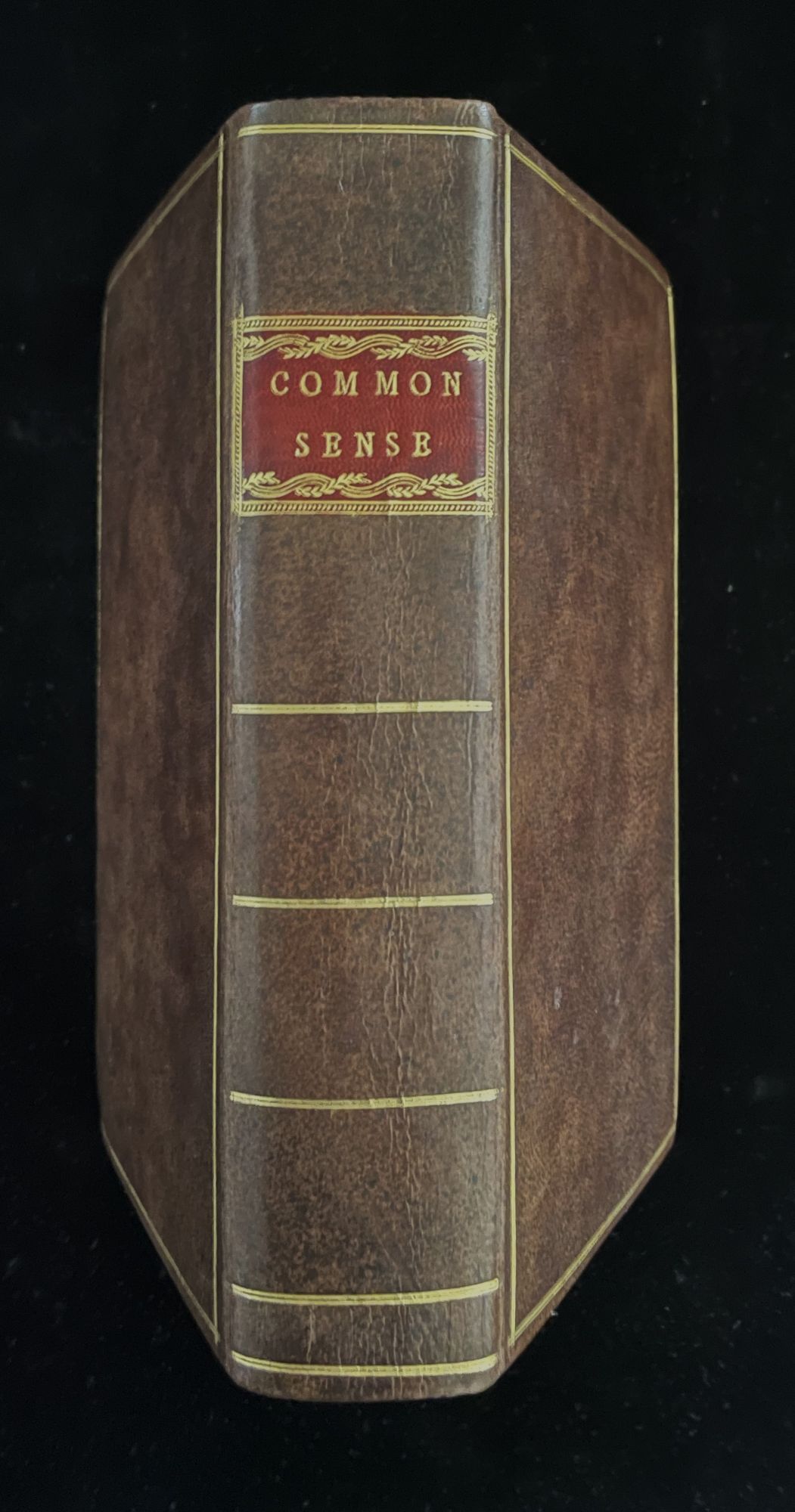
Price: US$125000.00 + shipping
Condition: Very Good
Description: A COLLECTION OF FIVE THOMAS PAINE PAMPHLETS ALONG WITH OTHER PAMPHLETS MOST PRINTED IN PHILADELPHIA. This collection was found in a perished 19thC leather binding; it has been newly rebound in late-18thC American style, full-leather. The text block has been restitched, with all components in the order as it was found, with endsheets retained. Leaves are moderately foxed throughout. COMMON SENSE Philadelphia: Printed. And Sold by W. and T. Bradford. (1776). (6) - 50. Gimbel CS-11. ESTC W32287. Evans 14959 Third edition of Paine's anti-monarchical pamphlet, printed the month after the first London edition of January 1776 by Robert Bell, and the first edition of the expanded text (and) RIGHTS OF MAN. Philadelphia: Re-Printed by Samuel Harrison Smith,1791.105 [1] ESTC W36410. Evans 23664. First American edition, wrappers missing, with both issue points present: stating "Second Edition" on the title page and containing the "Jefferson extract" (and) RIGHTS OF MAN PART THE SECOND. Printed by Messrs. Rice and Company, 1792. xi, [2],14-120p. ESTC W36436. Evans 24653 (and) DISSERTATIONS ON GOVERNMENT. Philadelphia: Printed by Charles Cist, at the Corner of Fourth a Arch-streets. And sold by Messrs. Hall & Sellers, Robert Aitken and William Pritchar in Market-street, 1786. [4],53,[1]p. ESTC W8587. Evans 19880 (and) LETTER ADDRESSED TO THE ABBE RAYNAL. Philadelphia: Printed by Melchoir Steiner .and sold by Robert Aitkin, 1782. [4], 70, [3], 72-77, [1] p. Evans, 17651. Hildeburn, C.R. Pennsylvania, 4226. Adams, 82-66a. Sabin, 58222 (and) LETTERS TO THE RIGHT HONOURABLE EMUND BURKE. Dublin: Printed for J. Sheppard, et al 1791. [2],123,[1]p. Upper right corner of title page and preface page missing a strip .75"x 3". ESTC T38567 (and) Markoe, Peter. THE TIMES. A POEM. Philadelphia: Printed for the author by Prichard and Hall, 1788. iv, [1], 6-35, [1] p. ESTC W29550 (and) Francis, Benjamin. THE CONFLAGRATION. Philadelphia: R. Aitken & Son, 1787. (2],37,[1]p. ESTC W37519. Evans, 20368 (and) Carey, Mathew. A SHORT ACCOUNT OF THE MALIGNANT FEVER PREVALENT IN PHILADELPHIA. Philadelphia: Printed by the Author, November 30, 1793. Third edition, improved. viii, [1], 10-112, [8], 16 (1). ESTC W29403. Evans 25257. Austin, R.B.410. Sabin 10884. Sabin 108. More detailed description and provenance available.
Seller: Johnnycake Books ABAA, ILAB, Salisbury, CT, U.S.A.

Price: US$242550.00 + shipping
Condition: Good
Description: *Price HAS BEEN REDUCED by 10% until Monday, April 29 (sale item)* .Constitution. II. Of Monarchy and Hereditary Succession. III. Thoughts on the present state of American Affairs. IV. Of the present Ability of America; with some miscellaneous Reflections. [two lines from Thomson]. first Connecticut edition; octavo (19 cm. tall), 56 pp., signatures [A]4 B-G4; general toning with age staining throughout, a light damp stain near center of title leaf and the verso has ink signatures of two previous owners, one modern and the other in an old hand (Eliphalet House?), untrimmed and string tied in self wrappers; all 1776 printings of Common Sense are now very scarce and this first Norwich printing is less frequently seen than the second; Evans 14857. - If you are reading this, this item is actually (physically) in our stock and ready for shipment once ordered. We are not bookjackers. Buyer is responsible for any additional duties, taxes, or fees required by recipient's country. Photos available upon request.
Seller: Zubal-Books, Since 1961, Cleveland, OH, U.S.A.
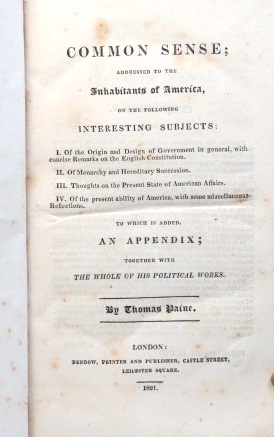
Price: US$250000.00 + shipping
Condition: Very Good
Description: FIRST EDITION, FIRST PRINTING sheets of Common Sense, here with the third edition title page and prefatory leaf. Richard Gimbels definitive study identifies points in every gathering distinguishing the three editions that Bell printed in early 1776. This copy of Common Sense contains all of the points of the first printing, save the two-leaf gathering [A]2 (title and preface). Bound in at the end is Paines Large Additions to Common Sense, which Bell pirated from a competitor and offered separately for one shilling to buyers of Common Sense. Paines Common Sense, published anonymously in January 1776, was the first vigorous attack on King George and the first public appeal for an American Republic. It is not too much to say that the Declaration of Independence of July 4, 1776, was due more to Paines Common Sense than to any other single piece of writing (Streeter). Born in England in 1737, Paine moved to London in 1774 where he met Benjamin Franklin, who encouraged him to emigrate to America. Franklin provided Paine with letters of introduction to his son William Franklin, royal governor of New Jersey, and his son-in-law Richard Bache, an influential merchant in Philadelphia. Paine arrived in America in November 1774, an unemployed 37-year old immigrant. Through Franklins influence, the brilliant but unpolished Paine gained access to many leading American intellectuals and soon became editor of the Pennsylvania Magazine. Within one year of his arrival, Paine was working on early drafts of Common Sense, which was published on January 10, 1776. The pamphlet, which immediately became the most talked-about publication in America, made Paine a the leading voice of revolution. Common Sense is brilliant in its simplicity and contains many of the most memorable phrases of the revolutionary period. Paine wrote, in America the law is King. For as in absolute governments the King is law, so in free countries the law ought to be King; and there ought to be no other. A government of our own is our natural right it is infinitely wiser and safer, to form a constitution of our own in a cool deliberate manner, while we have it in our power, than to trust such an interesting event to time and chance. It was the most brilliant pamphlet written during the American Revolution, and one of the most brilliant pamphlets ever written in the English language (Bernard Bailyn). The immediate success and impact of Common Sense was nothing short of astonishing. Common Sense went through twenty-five editions and reached literally hundreds of thousands of readers in the single year 1776 The pamphlets astonishing impact stemmed from the fact that it appeared at precisely the moment when Americans were ready to accept Paines destruction of arguments favoring conciliation and his appeal to latent republicanism, to the material interests of the colonists and to the widespread hopes for the future of the New World. By doing all this in a new style of writing and a new political language, Paine broke the ice that was slowly congealing the revolutionary movement (Foner, Tom Paine and Revolutionary America). Together with the Declaration of Independence, the Constitution, and The Federalist, Common Sense is one of the fundamental documents of the birth of our nation. The most recent census of Common Sense locates seventeen complete first editions. Only two of these remain in private hands, and neither is likely to appear for sale. The present volume, containing the first edition sheets, is the most desirable available copy of Common Sense, perhaps the most influential book in American history. Two volumes in one. Disbound, original stabholes visible. K1 detached with blank lower margin torn. Some staining, foxing and wear, old inscription on verso of title. Half morocco case. Gimbel, Thomas Paine. A Bibliographical Checklist of Common Sense (New Haven, 1956).
Seller: 19th Century Rare Book & Photograph Shop, Stevenson, MD, U.S.A.